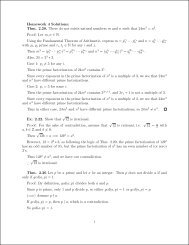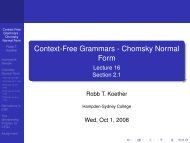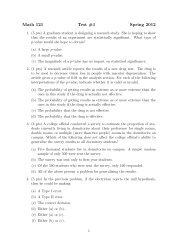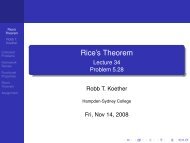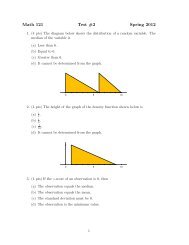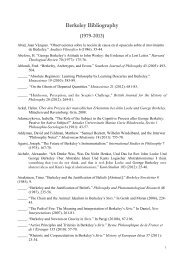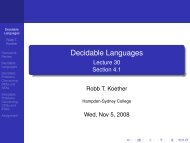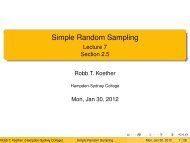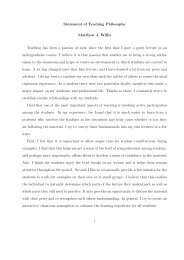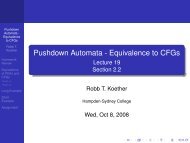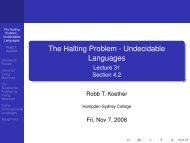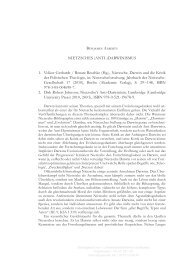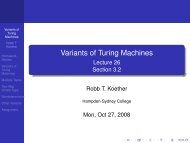Berkeley Is Pronounced Barclay - Home Pages
Berkeley Is Pronounced Barclay - Home Pages
Berkeley Is Pronounced Barclay - Home Pages
- No tags were found...
You also want an ePaper? Increase the reach of your titles
YUMPU automatically turns print PDFs into web optimized ePapers that Google loves.
ReviewsGeorge <strong>Berkeley</strong> De Motu and The Analyst: A Modern Editionwith Introductions and Commentary, Edited and Translated byDouglas M. Jesseph, Dordrecht, Kluwer Academic Publishers, 1992,Pp. x + 230 £51.00A tendency in recent critical work on De Mofu has been to relateit to certain current preoccupations in philosophy of science.Examples of this are Popper's discussion of <strong>Berkeley</strong> as aninstrumentalist" and various interpretations relating <strong>Berkeley</strong>'sviews to those of Mach and logical positivism. A feature of thistendency has been to ignore the specific historical context of thetext. Gerd Buchdahl's magisterial Metaphysics and the Philosophyof Science (1969) avoided this unhistorical approach and related<strong>Berkeley</strong> more closely to his contemporaries, presenting hisscientific views as a more rigorous development of those of Locke.While Richard Brook emphasised the role of <strong>Berkeley</strong>'s doctrine ofmeaning in relation to questions in the foundations ofmathematics and physics, in his <strong>Berkeley</strong>'s Philosophy of Science(1973). he also avoided the temptation of making <strong>Berkeley</strong> aprotagonist in twentieth-century controversies.Douglas Jesseph takes the same stance and assiduouslyavoids discussing <strong>Berkeley</strong>'s work in relation to contemporarydisputes. He presents a new translation of De Motu withoriginal text. He also includes an edition of The Analyst withintroductions to both texts. bibliographies and indices. Hisrationale for this publication is,theREVIEWSto present <strong>Berkeley</strong>'s two most important scientific texts in aform which meets contemporary standards of scholarshipwhile rendering them accessible to the modern reader.(p. ix)Unfortunately the goal is not entirely achieved, since in dealingwith De Motuthe book falls short of the standards of scholarshipcited, as I shall discuss. To a lesser extent this is also the case withThe Analyst.De Motuis introduced by ieviewing the major controversiesabout motion which influenced <strong>Berkeley</strong>. First there is an accountof the views of motion of a) Aristotle and the scholastics, b)Descartes and Galileo, c) Leibniz and d) Newton. The brief accountof Aristotelian and Medieval theories about motion relies on datedstudies and has no references to primary sources. This may beexcused, perhaps, since Jesseph states that "<strong>Berkeley</strong> apparentlyhad no detailed knowledge of Aristotelian and scholastic theoriesof motion" (p. 9). The sections on Galileo, Descartes and Leibniz arebetter served in this respect, with apposite quotations to illustratethe issues discussed. However the discussions are rather short.and indeed the section dealing with Newtonian mechanics hasdisproportionately long quoted passages to the small amount oftext.After this Jesseph presents particular disputed issues, suchas the "Vis Viva Controversy", Percussion and Gravitation. Thisserves as a brief orientation to reading De Motu, but there is noattempt at presenting interesting interpretative angles on the text.The four pages devoted to "The Place of De Motuin <strong>Berkeley</strong>'s5



